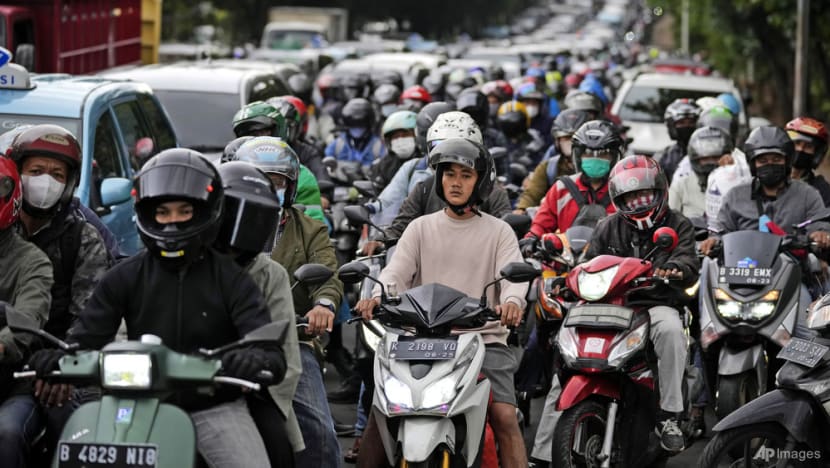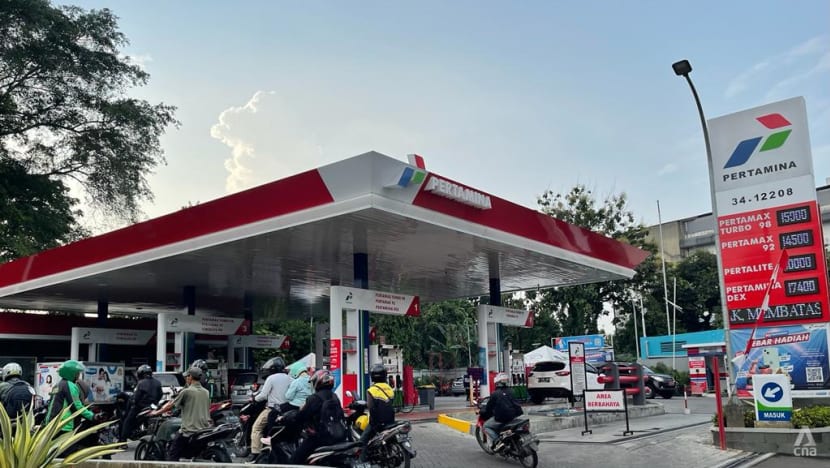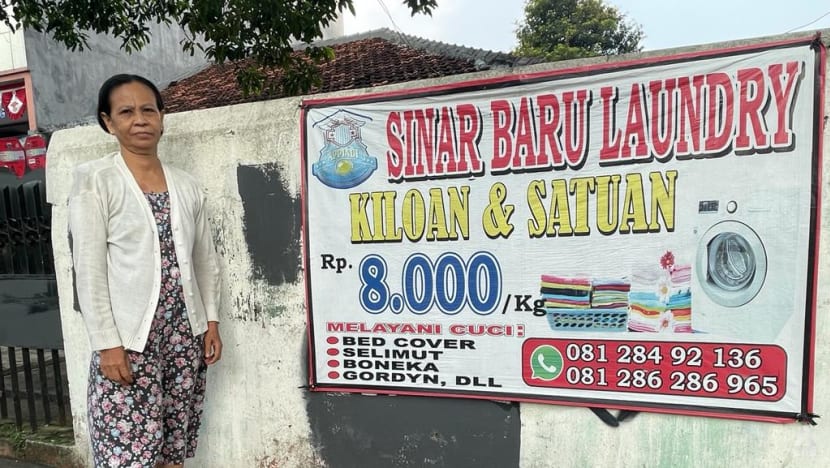‘There’s nothing we can do’: Indonesia’s small businesses brace for impact of fuel price hike
The government has raised fuel prices by about 30 per cent in order to rein in ballooning energy subsidies. Now, small businesses are worried about their profit margins.

File photo of motorists stuck in the morning rush hour traffic in Jakarta, Indonesia, Wednesday, Jan. 26, 2022. (AP Photo/Dita Alangkara)
JAKARTA: Zainal Ridho, 41, owns a car rental company in Banjarmasin, South Kalimantan.
Previously, the day rate for his Toyota Innova, including the price of subsidised Pertalite fuel, was 800,000 rupiah (US$54).
Last week, he raised the price to 900,000 rupiah per day, amid the widespread belief that the government would soon increase the price of subsidised fuel.
“I must explain to the customers why I have adjusted the rental price,” he said. While he still has loyal customers, some of them try to negotiate a better deal to get a lower price, he said.
Additionally, his 20 employees have also requested a salary increase as their expenses have been going up.
Last weekend, the government announced that it will raise subsidised fuel prices by about 30 per cent amid rising global prices.
The price of subsidised diesel rose from 5,150 rupiah per litre to 6,800 rupiah. Subsidised gasoline now costs 10,000 rupiah per litre, up from 7,650 rupiah previously.
The move is necessary to curb spending on ballooning energy subsidies, said President Joko Widodo last Saturday (Sep 3).
He said that the budget for energy subsidies nationally has swollen to 502.4 trillion rupiah, from the initial 152.5 trillion rupiah budgeted last year.
The government anticipates the fuel price hike to drive up inflation to about 6.6 per cent from 4.69 per cent currently.
Besides raising the price of diesel and 90-octane gasoline, known locally as Pertalite, the government also increased the price of 92-octane gasoline.
Called Pertamax, it went from 12,500 rupiah per litre to 14,500 rupiah per litre. Pertamax is usually used by car owners with newer and bigger engines.
The fuel price hike came into effect an hour after the president’s announcement.
To soften the blow, the government said that it will disburse direct cash transfers to about 20 million poor households.
“We will distribute 150,000 rupiah per month starting from September for four months to 20.65 million underprivileged families,” said Mr Widodo during the televised announcement.
Despite these measures, there were sporadic protests in several Indonesian cities this week.
In Jakarta, thousands of people rallied against the price hike. Similar protests were also held in other cities such as Surabaya, Makassar and Kendari.
On the back of the fuel hike, the transport ministry said on Wednesday that fares for app-based motorbike taxis, a popular mode of daily transport, will also go up.
Fares per kilometer will increase by between 6 per cent to 13.3 per, effective from this weekend.
As a lower-middle-income economy with a gross national income per capita of US$4,140 last year, Indonesia’s economy is dependent on its micro, small and medium enterprises (MSMEs).
About 98 per cent of these are micro-enterprises that are sensitive to even minor economic policy shifts.
While it is still early days to see the full impact of the fuel price hike, enterprises across Indonesia are already bracing themselves for how it would hit them in the long run.

SMALL BUSINESSES FEEL IMPACT IMMEDIATELY
For many small companies, they have started to feel the pinch of the fuel price hike.
Arifin, who owns a car rental company in Timika, Central Papua told CNA: “Usually, I buy Pertalite for 250,000 rupiah per day but now I have to spend 350,000 rupiah.
“But if I increase the rental rates, the customers will say it’s expensive.”
Thus, Arifin, who goes by one name, has decided not to raise prices for now.
“My family and I have to tighten our belts for our daily needs. And for the car rental rates, we use the old rates so my customers don't switch to other car rentals,” he explained.
Elsewhere, Rita Suryaningsih, who is an entrepreneur in Makassar, South Sulawesi said that the fuel price hike has affected her distribution costs.
She owns a micro-business producing traditional ginger drinks and distributes her product by land to retailers.
“Our courier usually uses a motorbike and used to spend 35,000 rupiah for fuel daily. But now it has increased to 50,000 rupiah,” she said.
With a profit of 10 million rupiah per month and four employees to take care of, she hopes her business will be able to weather the storm in the upcoming months.
“Even if prices go up, hopefully we’ll be able to survive.”
Laundry owner Paniem in Jakarta is also concerned about higher transport costs.
“My daughter delivers the laundry to our customers. So there is an impact on our business, but what can we say?
“There’s nothing we can do. We are just ordinary folks,” said Paniem who goes by one name.
For now, she is sticking to her regular rate of 8,000 rupiah per kg as she worries that raising the prices may drive her customers away.

WORRY ABOUT THE FUTURE
There are also others who have yet to feel the full impact of the hike. However, their concern is that higher transport costs may lead to ballooning production costs as well as personal spending amid an uncertain economic climate.
Rina Hasibuan from Medan, North Sumatra, who sells homemade coffee drinks, worries that the fuel price increase will impact the cost of raw materials needed for her product as distribution cost rises.
“The higher the price of raw material, means my product will be pricier.
“While when the price gets higher, there are fewer customers,” said the 39-year-old.
The single mother of two fears that the price of cooking gas, raw material for packaging and coffee beans will soon surge.
In Bali, single mother of three Nyoman Dewi usually sets aside 300,000 rupiah for Pertalite per week and is concerned she will now need to fork out more.
She is dependent on her car to drive her three children to school as there is no public transport in their neighbourhood.
Dewi runs several tutoring centres and she wonders if her pupils will continue to study there given the current economic situation.
She also is thinking of her nine employees who all use motorbikes to get to work.
“Their salary is dependant on the total number of students we have so everything is related. The more students we have, the more salary they get,” she said, adding that she has not raised the tuition fee for two years amid the COVID-19 pandemic.
BUSINESSES NEED TO ADAPT, SAYS SMALL ENTERPRISES ASSOCIATION
What do businesses need to do in order to weather the storm?
Hermawati Setyorinny, the chairwoman of the Indonesian Micro, Small and Medium Enterprise Association, said that MSMEs have no other option but to adapt to the situation and try to survive.
“We need to find strategies. There are those who are looking for solutions to replace cheaper alternative materials, reduce the quantity, or just accept that they will profit less.
“The last solution is to increase the price, even if it's a little bit,” she told CNA.
Eddy Satria, a senior official in charge of micro-business with the Ministry of Cooperatives and Small Medium Enterprises said that his ministry has been asking its counterparts in the Ministry of Finance to distribute aid for micro-enterprises.
“We proposed at that time for 12.8 million micro-businesses to receive 600,000 rupiah.
“We are now waiting for it to help micro-businesses affected by the fuel price hike,” he said.
Read this story in Bahasa Indonesia here.
















